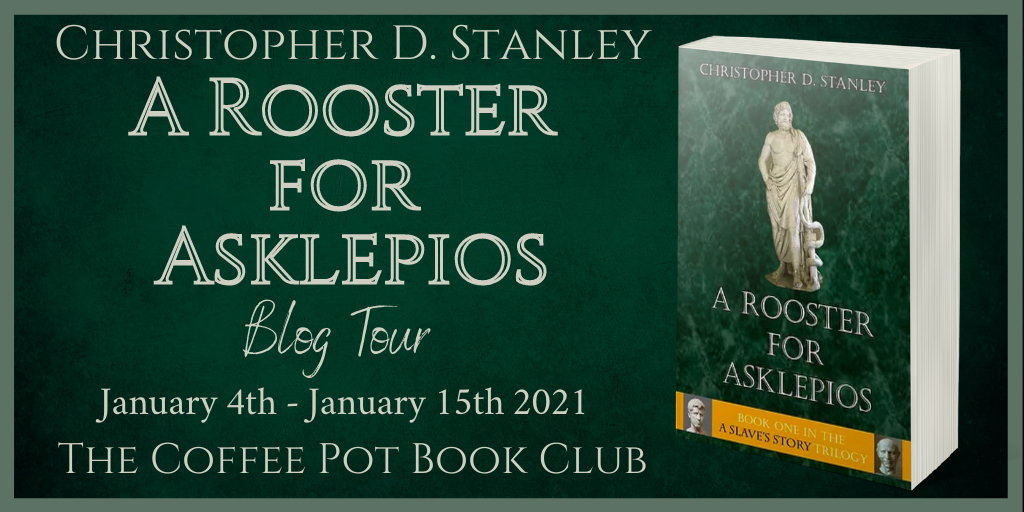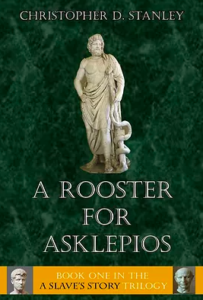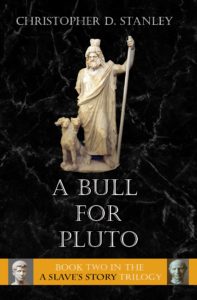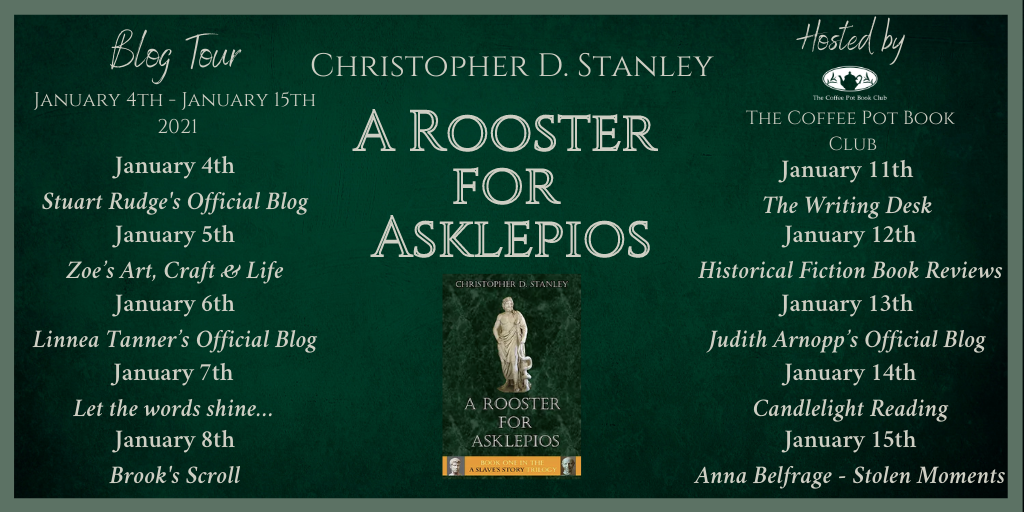06 Jan Christopher D Stanley A Rooster for Asklepios Blog Tour The Coffee Pot Book Club #HistoricalFiction #ARoosterforAsklepios #BlogTour #CoffeePotBookClub

Featured Author Christopher D. Tanley
It is my pleasure to feature Christopher D. Stanley as part of The Coffee Pot Book Club Blog Tour being held between January 4th – January 15th, 2021. Christopher is the author of the historical fiction novel, A Rooster for Asklepios (A Slave’s Story Trilogy, Book 1). The first book was released on May 23rd, 2020 by Amelia Books (522 pages). The 2nd book in the series, A Bull for Pluto was released on June 17th 2020 by Amelia Books (325 pages).
Below are highlights of A Rooster for Asklepios (Book 1) and A Bull for Pluto (Book 2) from A Slave’s Story Trilogy; Christopher D. Stanley’s biography; and my review of his first book in the series.
Praise for A Rooster for Asklepios and A Bull For Pluto
This compelling and enjoyable story offers the reader a superb ‘insider’ view of life in the first-century Greco-Roman world. I enjoyed traipsing around Anatolia with Lucius and Marcus!”
-Dr. Terence Donaldson, Academic Dean and Professor of New Testament, Wycliffe College, Canada
“The realism of this story reflects the author’s deep first-hand knowledge of the landscape and culture where the narrative takes place.”
-Dr. Mark Wilson, Director, Asia Minor Research Center, Antalya, Turkey
“This well-researched book really brings the Roman world to life!”
-Dr. Alanna Nobbs, Professor of Ancient History, Macquarie University, Australia
“The amount of research, imagination, and effort involved in crafting this story earned my admiration, and stirred my curiosity, too.”
Dr. Mark Nanos, Lecturer, University of Kansas, USA
Highlights of A Rooster for Asklepios

A Rooster for Asklepios
(A Slave’s Story Trilogy, Book 1)
by Christopher D. Stanley
Marcus, a slave in the household of Lucius Coelius Felix, enjoys a better life than most slaves (and many free citizens) as the secretary and accountant of a wealthy aristocrat. His master is rising in the civic life of the Roman colony of Antioch-near-Pisidia (central Turkey), and his responsibilities and income are growing as well. If this continues, he could soon earn enough to buy his freedom, set up a small business, and even marry.
Then misfortune strikes, and his master falls into a deep depression that is exacerbated by a nagging illness that his physician is unable to cure. The future looks bleak until the physician receives a dream from the healing god Asklepios calling Lucius to travel hundreds of miles across western Asia Minor to his sanctuary at Pergamon for treatment and, he hopes, a cure.
Accompanied by Marcus and his new wife Selena, Lucius embarks on a long and eventful journey in which both master and slave encounter people and ideas that challenge long-held beliefs about themselves, their society, and the world around them. Values are questioned, loyalties tested, and identities transformed in a story that brings to life a corner of the Roman empire that has been neglected by previous storytellers.
Buy Links:
Amazon UK • Amazon US • Amazon CA • Amazon AU
Highlights of A Bull for Pluto

A Bull For Pluto
(A Slave’s Story Trilogy, Book 2)
By Christopher D. Stanley
After a lengthy and eventful stay at the sanctuary of Asklepios in Pergamon, the time has come for Lucius and Marcus to return to Antioch. Selena had been sent home earlier when Lucius learned that she was pregnant, and the impending arrival of the winter snows could soon make it impossible for them to reach their destination before the child is born.
To Marcus’s surprise, Lucius announces that he plans to stop for a while in Hierapolis to bask in the healing waters of the city’s renowned hot springs. Here Marcus meets a young woman named Miriam who challenges him to embrace his long-hidden Jewish ancestry. Marcus is torn between his budding love for Miriam and the cost of heeding her advice.
A tragic decision by Lucius seals their fate, as their full attention must now be devoted to preserving Lucius’s life. They reach Antioch in time to learn that Lucius’s son Gaius has failed miserably in his management of the household while his father was away. If Lucius should die, Marcus, Selena, and her unborn child will be at the mercy of this tyrant.To fend off this danger, Lucius must tell Marcus the full truth abut his past, a truth that will ensure Marcus’s future at the cost of his master’s honor. Can he bring himself to act before his inevitable end?
Buy Links:
Amazon UK • Amazon US • Amazon CA • Amazon AU
Author Bio: Christopher D. Stanley

CHRISTOPHER D. STANLEY is a professor at St. Bonaventure University who studies the social and religious history of the Greco-Roman world, with special attention to early Christianity and Judaism. He has written or edited six books and dozens of professional articles on the subject and presents papers regularly at conferences around the world. The trilogy A Slave’s Story, which grew out of his historical research on first-century Asia Minor, is his first work of fiction. He is currently working on an academic book that explores healing practices in the Greco-Roman world, a subject that plays a vital role in this series.
Connect with Christopher:
Website • Facebook • Twitter • Instagram • Goodreads
A Rooster for Asklepios Book Review
A Rooster for Asklepeios by Christopher D. Stanley is a historical fiction novel about a Roman aristocrat, Lucius Coelius Felix, and his educated slave, Marcus, in the backdrop of mid-1st century Asia Minor (modern-day Turkey). Despite their differences in status—master and slave—Lucius and Marcus both aspire to rise as they navigate through the changing political, religious, and cultural climates in their times. Recently widowed, Lucius finds his duties as both an agoranomos (city administrator with control of the marketplace) and partner in a luxury goods business overwhelming and thus depends on Marcus to help him keep accurate accounts and record all meetings. Just as his fortune seems to be rising, Lucius begins to suffer from an abdominal illness that at times incapacitates him. He relies heavily on Marcus to assist him in both his personal and business needs. To show his gratitude, Lucius helps Marcus set up a rudimentary business in the marketplace. As Lucius’s health deteriorates, he faces further challenges with the misconduct of his son and the discovery that his business partner secretly practices Judaism, a religion frowned upon by Roman aristocrats. After losing his civil position, he finds comfort in the arms of a female slave, Selena, and shocks everyone when he announces that he is going to free and marry her. As his maladies worsen, Lucius seeks relief through a local physician. After bringing a rooster to offer as a sacrifice, Lucius sleeps in the local temple of Asklepios (god of healing). There, he is told by a priest that the healing God wants him to travel to Pergamum and visit his temple there. He decides to embark on hundreds of miles journey with Marcus and his newly pregnant wife across western Asia Minor to the sanctuary at Pergamon to be cured by Asklepios. Both the lives of Lucius and Marcus are transformed as they meet new people in various cities and are introduced to new philosophical and religious beliefs.
Author Christopher D. Stanley has the keen eye of a historian as he weaves the ancient story into the rich tapestry of everyday life and rituals performed by Roman aristocrats in their homes and in temples. The author remains true to actual historical accounts based on his impeccable research. It felt as though I was being led by a tour guide through all of the individual streets, houses, and public buildings as Lucius’s entourage visits each city. It was interesting to learn about the extensive planning that a traveler must do to journey long distances back then. If possible, travelers arranged to lodge in households of friends or business acquaintances rather than stay in hostels or inns. Contrasts among various religions (pagan, Judaism, and Christianity) are explored, and rituals at temples are vividly described as Lucius seeks treatment. Also, it’s fascinating to learn how medicine was practiced at a time in which the Hippocratic Oath was adopted.
The story is primarily told from Marcus’s point of view, although other perspectives are interjected throughout the story. The characters are most engaging when they face universal issues such as Lucius’s conflicts with his son who’d rather compete in local games than learn the family business. Both Lucius and Marcus must come to grips with their prejudices and open their minds to other beliefs and cultures. Admittedly, I prefer more action in a historical fiction novel and felt the story was too slow-paced, at times, with inordinate historical detail. However, it is highly recommended for readers who enjoy reading a challenging book that explores the philosophies and the beliefs of various cultures in ancient civilizations and that pulls you into the everyday life of a person in the ancient Greco-Roman world.




No Comments